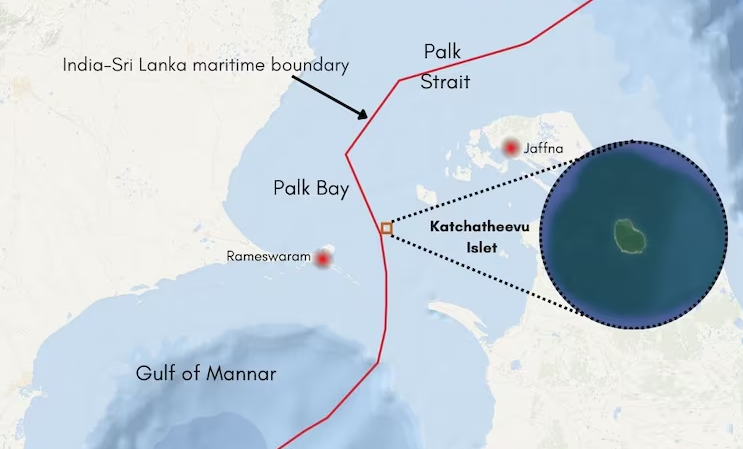Syllabus: GS2/India & Its Neighbourhood Relations
Context
- The maritime boundary between India and Sri Lanka, particularly in the Palk Strait, has been a long-standing contentious issue. Allegations of illegal fishing, destructive fishing practices, and frequent arrests of Indian fishermen by the Sri Lankan Navy have fueled diplomatic tensions between the two nations.
Historical Context
- India and Sri Lanka have defined their maritime boundary through a series of agreements, focusing on territorial waters, exclusive economic zones (EEZ), and fishing rights:
- 1974 Agreement: India recognized Sri Lanka’s sovereignty over Katchatheevu, an uninhabited island in the Palk Strait.
- 1976 Agreement: Extended the maritime boundary and restricted fishing rights to the respective countries.
Key Issues
- Recurrent Arrests & Seizures:
- Indian fishermen, especially from Tamil Nadu, frequently cross the International Maritime Boundary Line (IMBL) in search of fish due to depleting fish stocks in Indian waters.
- Sri Lankan authorities have responded with arrests, boat confiscations, and legal actions, straining diplomatic relations.
- Violation of the International Maritime Boundary Line (IMBL):
- The IMBL, established under the United Nations Convention on the Law of the Sea (UNCLOS), demarcates territorial waters.
- Indian fishermen claim historical fishing rights beyond the IMBL, leading to legal and diplomatic conflicts with Sri Lanka.
- Ecologically Destructive Fishing Methods:
- Bottom trawling by Indian fishermen is a major concern for Sri Lanka, as it damages marine habitats and depletes fish stocks.
- Sri Lankan fishermen advocate for sustainable fishing practices to protect their waters from over-exploitation.
- National Security Concerns:
- Sri Lanka fears that organized trawler intrusions could be exploited by Tamil militant groups for illegal activities.
- Katchatheevu Island Dispute:
- Indian fishermen retain limited rights to use Katchatheevu for drying nets and resting, but its sovereignty remains a contentious issue.
- Tamil Nadu politicians periodically demand its return to India, keeping the dispute alive in public discourse.
- Livelihood Crisis:
- Declining fish stocks in Indian waters have forced Indian fishermen into Sri Lankan territory, increasing conflicts.
- Sri Lankan Tamil fishermen, recovering from decades of civil war (1983–2009), find their livelihoods threatened by Indian fishing incursions.

| International Laws on Freedom of Fishing – UN Fish Stocks Agreement (UNFSA, 1995): Requires nations to comply with Regional Fisheries Management Organizations (RFMOs) for fishery access. – UNCLOS (1982): Article 87 restricts high-seas fishing for states that fail to comply with international conservation measures. |
Recent Developments
- Diplomatic Talks & Agreements: India and Sri Lanka have held multiple discussions on the issue, with Sri Lanka urging India to ban bottom trawling.
- Joint Working Group on Fisheries: A bilateral mechanism to address fishing disputes and explore sustainable solutions.
- Deep-Sea Fishing Initiatives: The Indian government has introduced schemes to promote deep-sea fishing, but implementation has been slow.
- Continued Arrests: Despite diplomatic efforts, arrests of Indian fishermen persist, with incidents reported in 2023, 2024, and early 2025.
Potential Solutions
- Bilateral Agreements on Fishing Rights:
- A structured agreement allowing regulated access to Sri Lankan waters for Indian fishermen under specific conditions.
- Technology and Sustainable Fishing:
- Encouraging Indian fishermen to adopt sustainable fishing practices and transition to deep-sea fishing instead of bottom trawling.
- Joint Patrolling and Monitoring:
- Strengthening cooperation between Indian and Sri Lankan Coast Guards to prevent illegal crossings and ensure fair treatment of fishermen.
- Compensation and Livelihood Support:
- The government should provide financial aid and alternative employment opportunities for affected fishermen to reduce dependence on illegal fishing.
- People-to-People Diplomacy:
- Facilitating dialogue between Indian and Sri Lankan fishing communities to foster mutual understanding and reduce tensions.
Conclusion
- The India-Sri Lanka maritime dispute remains a complex issue with economic, diplomatic, and ecological dimensions. While diplomatic discussions continue, a comprehensive approach involving sustainable fishing practices, alternative livelihoods, and enhanced maritime cooperation is crucial to achieving a long-term resolution.
Source: TH
Previous article
News In Short 11-2-2025
Next article
Corruption Perceptions Index (CPI) 2024